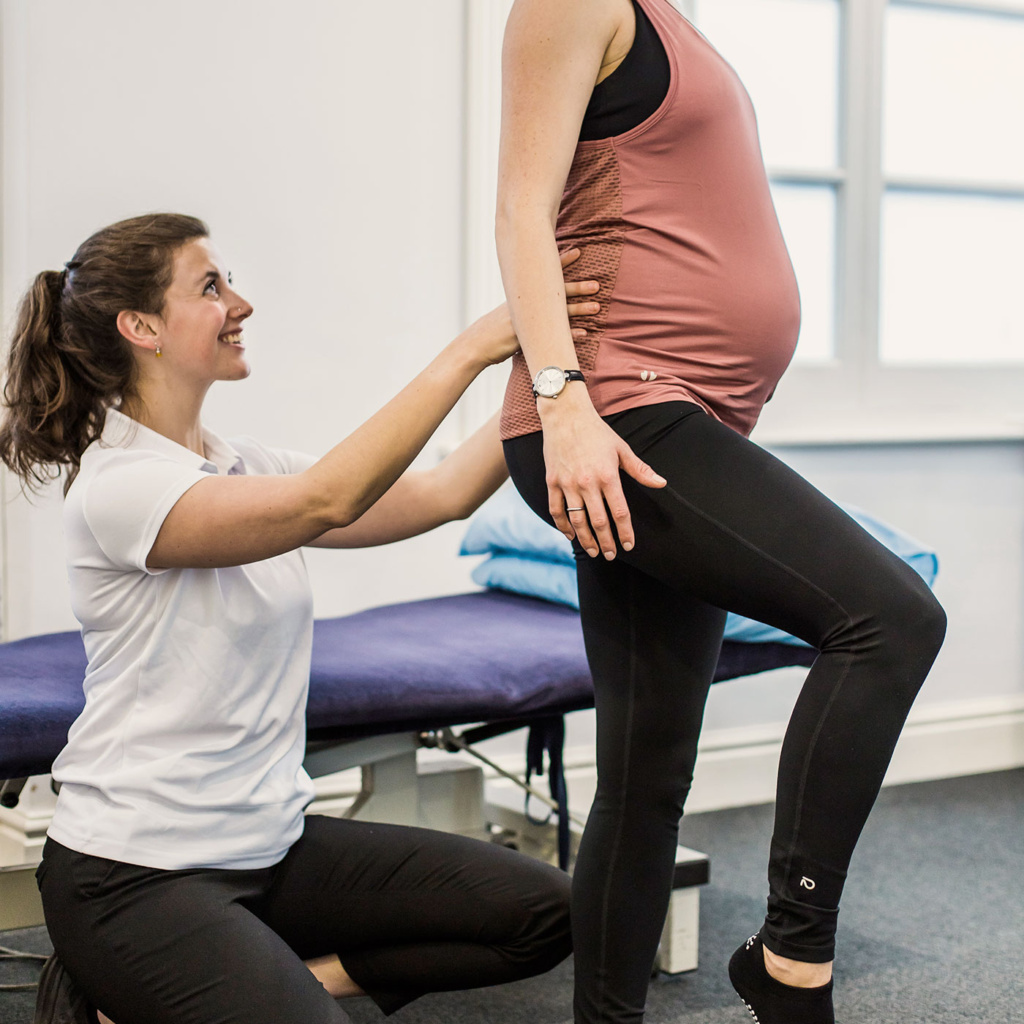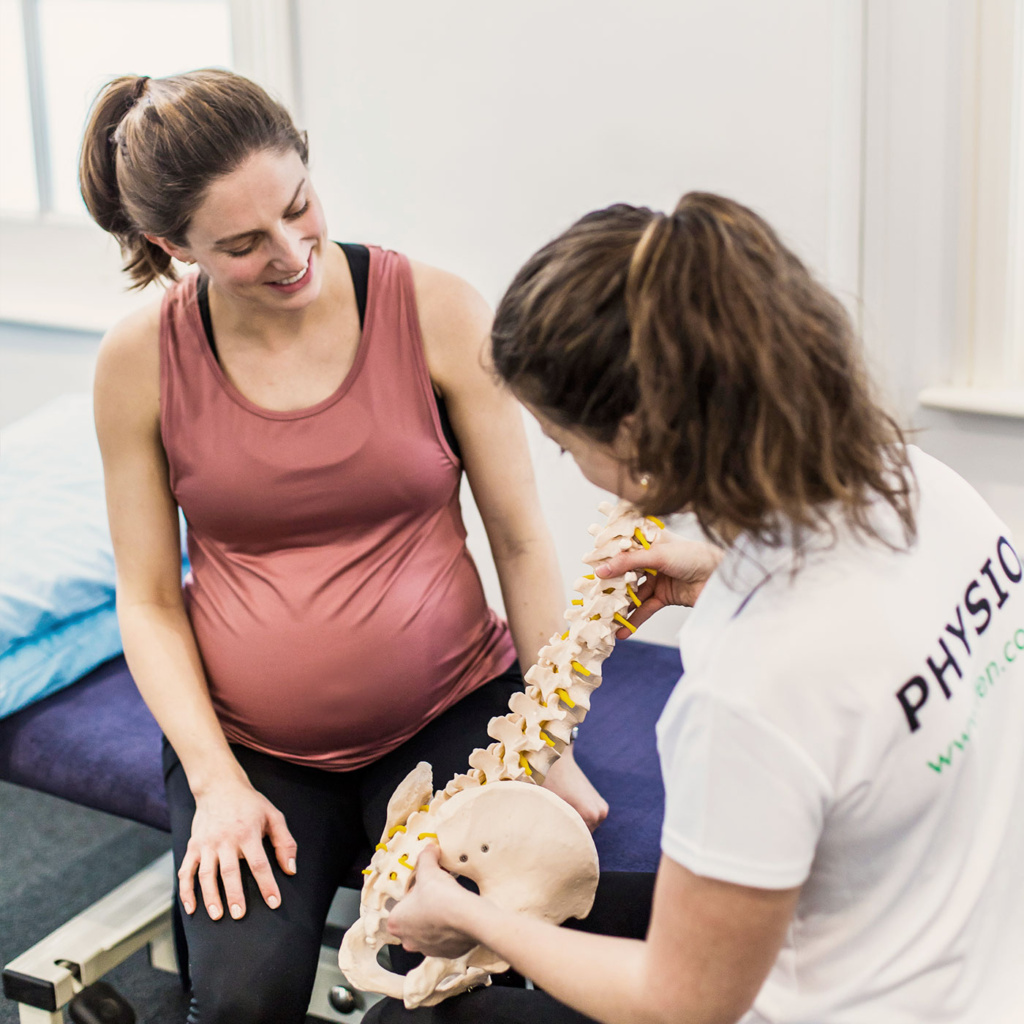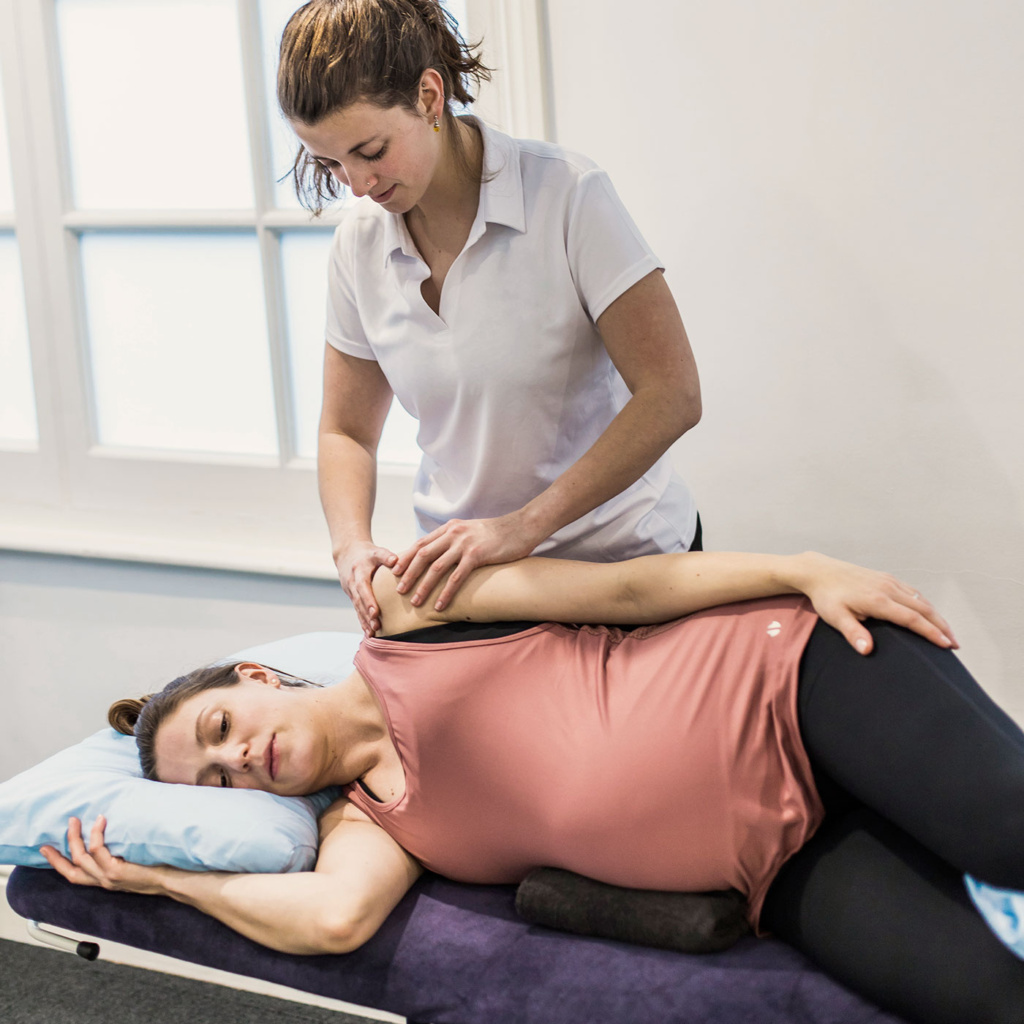
Why have Prenatal Physiotherapy?
Even with the safest and most straightforward pregnancy, the normal and natural changes that your body is undergoing can be uncomfortable and worrying. With the right support at the right time, you will be able to cope better with these changes and recover faster from their impact.
Ten’s specialist Women’s Health Physiotherapists can assess, diagnose and treat any conditions or pain you may experience, during or after pregnancy.

Prenatal Assessment
Even if you’re not experiencing any significant discomfort or other symptoms during your pregnancy, we would always recommend having a Prenatal Assessment.
– What is a Prenatal Assessment?
A Prenatal Assessment is a full screening and assessment that will help you prepare your body and pelvic floor for labour. It helps to identify any areas of risk or concern, and provide solutions to help minimise their impact.
– Why have a Prenatal Assessment?
Prenatal Assessments have been shown to reduce the risk of perineal tearing and serious postnatal complications by up to 40%. As a result, you’re less likely to require extended postnatal physiotherapy treatment, or onward referral to a consultant or surgical review.
If you have questions or would like to talk in confidence to one of our Women’s Health Physiotherapists, please contact us.

Ongoing support
As your pregnancy develops and you prepare for labour, our specialist Women’s Health Physiotherapists can provide advice, guidance and, where necessary, treatment for any symptoms, issues or concerns you may experience.
We can offer information about safe posture and movement during pregnancy, and help you start or continue exercising correctly and with confidence.
Whilst pregnancy changes many things about life, we feel it shouldn’t change your access to fitness and health support.
Reasons you would benefit from Prenatal Physiotherapy:
- to identify any areas of weakness, or disfunction that could injury, pain or other issues during your pregnancy or childbirth
- to help with pain relief – lower back pain, pelvic pain, sciatica and carpal tunnel syndrome are common when you are pregnant.
- we can show you how to manage your sitting, standing and lying posture and body positioning to keep you safe and comfortable as your pregnancy develops
- guidance on how to exercise safely during pregnancy, from pelvic floor training through to advice and guidance on how to modify your preferred workouts, from running to gym sessions
- a bespoke prenatal exercise programme designed specifically around you and your pregnancy
- in person 1-1 sessions to take you through your exercise programme
- preparation for labour
Many of our Pelvic Health services are covered by insurance – please call your preferred studio to check before booking.
Common issues during pregnancy
-
Pelvic Girdle Pain
Approximately half of women will experience pelvic girdle pain during their pregnancy. This can start as early as the first trimester. Physiotherapy is very effective for the treatment and management of pelvic girdle pain. Early treatment allows women to stay active throughout their pregnancy and prevent further problems as the pregnancy progresses. Our specialists use a combination of bespoke exercise prescription, manual therapy, acupuncture, mobilisations, postural correction and movement advice.
-
Diastasis Recti (abdominal separation)
All women will experience some level of abdominal separation in the latter stages of pregnancy as the connective tissue between the abdominal muscle stretches to accommodate the growing baby. Pelvic health physiotherapy focuses on targeted exercises during pregnancy to improve and minimise abdominal separation postnatally.
-
Incontinence
One in three women experience incontinence in the first year after having a baby. Strengthening the pelvic floor and pelvic muscles during pregnancy is the best way to prevent incontinence postnatally. However, as up to 70% of people complete their exercises incorrectly, working with a specialist Physiotherapist will ensure that you are performing the techniques correctly, and get the best possible outcome from your treatment. Our specialist physios will assess your pelvic floor strength and, as there are many different ways to strengthen your pelvic floor, they will guide you through the variations and tailor your programme to best suit your individual needs.
-
Constipation
Constipation is more common during pregnancy than in the general population, with about 40% of women being affected. Contrary to popular belief, there are ways of reducing constipation during pregnancy using a range of different physiotherapy techniques.
-
Exercise
In almost all instances, exercise is beneficial during pregnancy. However, it can be difficult to know which form of exercise will be most effective. Often it’s dependent on the individual – what works for one person can have the opposite effect for another. Our specialist Physiotherapists offer bespoke advice and exercise programmes based around your body, your history and your needs, to ensure that you stay healthy and pain-free during your pregnancy.
-
Carpal Tunnel
Up to 60% of women will experience carpal tunnel syndrome during their pregnancy. Carpal tunnel causes pain and numbness in the hands and wrists during pregnancy. The additional fluid in the body can lead to compression and irritation of the median nerve in the wrist. The symptoms can be treated with splints, manual therapy and daily exercises.
NEED HELP?
Speak to a Pelvic Health Specialist
FAQ
About Prenatal Physiotherapy

Still have questions? Read our full FAQs or contact our team, and we'll be happy to assist
-
Is Physiotherapy safe during pregnancy?
Yes – it is definitely safe to have Physiotherapy whilst you are pregnant. It actually has many positive benefits which can help to reduce any pain or discomfort you may get from pregnancy related symptoms.
Our team of specialist Physiotherapists will provide you with tailored advice, guidance and treatments based on your personal needs and requirements. All of our Prenatal Physiotherapy sessions are bespoke to give you and your little one the best personal care possible.
-
How does Physiotherapy help prepare you for labour?
Maintaining and improving strength, stability and cardiovascular fitness during pregnancy is essential to prevent health issues during pregnancy, promote your chances of a smooth delivery, support your postnatal recovery, and improve the health of your growing baby.
Prenatal Assessments, carried out by our specialist Physiotherapists, provide bespoke exercise programmes, as well as general advice on appropriate exercise classes and regimes. Tailored strengthening exercise, for the pelvic and core muscles, reduce the risk of pelvic girdle pain and help to prepare the body for vaginal delivery or caesarean section. Strengthening the pelvic floor during and after pregnancy can also greatly reduce the risk of developing incontinence, pelvic organ prolapse symptoms and pelvic pain.
Unfortunately, up to 70% of people complete their pelvic floor exercises incorrectly. To help you avoid or reduce the risk of pelvic floor issues, an assessment with one of our specialist Physiotherapists will assess the strength and endurance capability of your pelvic floor, as well as ensure you are completing the exercises effectively.
Additionally, our Physiotherapists teach perineal massage that can reduce your risk of tearing during vaginal delivery by up to 40%.
-
Do you provide physio after childbirth?
Pregnancy and labour itself can have significant and often lasting effects on a woman’s body. They can cause a number of Pelvic Health issues including constipation, pelvic or back pain, incontinence and pain during sex.
Fortunately, most of these issues are preventable and/or treatable. Ten’s specialist Women’s Health Physiotherapists can provide advice and guidance on any postnatal symptoms, issues or concerns, and we can assess, diagnose and treat any conditions or pain you may experience after pregnancy.

